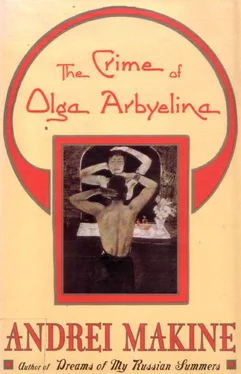Suddenly her mind made a rapid connection: the characters on those panels, Li and… that masked ball! How had she failed to notice the resemblance earlier?
A good many of the guests in costume were destined to crop up thirty years later on panels created by a whimsical photographer installed in the basement of an old house in Paris. In the feverish gyrations of that carnival long ago Olga had indeed glimpsed an operatic musketeer, a queen with her tall medieval headdress, a ghost making its white garb ripple. And even, in one of the little empty rooms in that mansion, an Othello, a fat man outrageously daubed with black, and drunk, no doubt, thundering out a desperate bravura melody on a piano, while smearing the white keys with muddy fingerprints… The twelve-year-old girl threading her way secretly across the great estate filled with music and laughter is herself, a distant reflection of herself. The adults are too busy with their masquerade to notice her shadow slipping along the walls, avoiding the costumed whirlpools. It is with a disturbing sharpness that the girl, who has just stolen out without permission from the little estate cottage where she was supposed to spend this festive night, experiences her autonomy, her liberty, her strangeness in a world clothed in merry madness. Above all, she is aware of the singularity of these, her childhood years: her father was killed in the Russo-Japanese War; her mother has "buried herself alive" (so say the grown-ups) in a fervent isolation made up of prayers, long hours spent upon her husband's grave, and nocturnal séances with a famous spiritualist, who gives her glimpses of the features of the dear departed and is ruining her. The girl lives in her uncle's family, a man who "will sell his last shirt to throw a party." This masked ball one fine June evening marks the start of a long series of festivities, hunting parties, amateur theatricals on a stage by the entrance to the garden… The girl senses that the freedom she enjoys proves something is out of control in this great mansion. She knows that in her grandmother's time they would never have allowed a child to join in a grown-up party. This casual attitude disturbs her and at the same time excites her… In a drawing room she comes upon a strange figure: an adolescent girl, dressed as a magician, sitting in the angle of a little sofa, fast asleep. Her tall headdress covered in stars sits beside her; her magic wand has slipped onto the floor. The girl picks up this instrument of magic and, not knowing what to do with it, touches the magician's forehead lightly with the end of it. The magician murmurs something in a whisper but does not wake up. The magician is "a daughter of poor parents" whom they put in charge of the fireworks and magic tricks at parties… The girl steals the wand and goes off to continue her exploration. In the corridors she is jostled by groups of people in costume suddenly spilling out in an explosion of shouting, a fiery rustling of silks, a clattering of heels… Exhausted at last, almost sleepwalking, she comes to a kind of small drawing room with no window, a remote corner: she has never known what it was for. It is lit by one candle, around which the melted wax is already forming a little glistening pool on the varnished surface of the table. The girl stops on the threshold. Her first impression fascinates her: she sees a man, a veritable colossus, dressed like a peasant in the folktales, half lying in a broad armchair and using his hands to manipulate a big puppet he has mounted on his stomach. But the puppet begins to speak with a woman's voice, musical, strangely musical and somehow tearful… Yes, it is a woman straddling the huge body of the man, who has his arms stretched out along the armrests. From time to time the woman interrupts her murmuring and her face is transformed into that of a bird of prey: she peppers the somnolent face of the man with swift, insistent, stabbing kisses… All of this is quite bizarre, especially in this room where it feels as if the coughing of the grandparents' old servant can still be heard. The girl would like to touch the woman's body, a very slender, nervous body swathed in a froth of muslin. This restless body seems to grow directly out of the man's stomach. It appears as if she has no legs, just this gauze of muslin that looks as if it covered the hollow trunk of a puppet. And the fine, long cigarette she holds in one hand extended far away from their bodies gives the impression of fluttering about on its own in the darkness… Suddenly the man's face lights up, he utters a noisy gasp. His hands grip the armrests. And the girl realizes that they are not armrests but the woman's legs, her long thighs clad in gleaming black stockings. The man half stretched out in the chair moves heavily, plunges his hands into the muslin, and shakes the woman with such violence that the long cigarette rolls upon the ground. His huge hands plunge into the woman's flimsy dress as if it were a puppet's empty costume. The idea of this missing body is alarming. The girl prepares to run away, takes two steps backward, and suddenly, with a noise that seems to her deafening, drops the magician's wand. The woman turns, pivoting on the man's body…
Olga drank the infusion in her room. As she put the bowl on her bedside table she heard the voice of the "little bitch" once more: "You've got all the quirks of an older woman. Your bowl; soon it'll be little medicine bottles, a shrine for your declining years…" But the words hurt less than usual. For now she knew the hiding place of the mocking voice: in the great mansion during a party, where a twelve-year-old girl was discovering the cavernous complexity of life. As she ran through the corridors there was, among other things, the servant she caught drinking champagne from the guests' glasses… Now her thoughts were quite confused: "It's really effective, this infusion," she had time to say to herself. "I must recommend it to Li. She stuffs herself with sleeping pills and then cries in her nightmares…" Sleep overcame her so quickly that her hand, stretched out toward the lamp, stopped halfway.
On Monday morning at the library there was a constant procession of readers, as if they were deliberately conferring outside the door and coming in one after the other, each to tell her their story. And indeed for a number of them, solitary and often ashamed of their solitude, the library was the only place where there was someone, she, Olga Arbyelina, to listen to them.
The first to come was the nurse from the retirement home, the "Russian retreat" located on the ground floor of the former brewery. A tall, dry woman, whose youthfulness had been overlaid by the air of arrogant and peevish mourning she had imposed on herself. She wore mourning for a person who had never existed and who had been born by chance in conversation when, to conceal her loneliness, she had hinted at a distant loved one, an English fighter pilot, about whom she could not say very much in wartime, for obvious reasons. From one admission to the next this phantom had lived his invisible life, blossoming with a multitude of details, in the heart of the woman who had invented him, adding to his exploits, being promoted… His life had inevitably come to an end at the end of the war. Otherwise she would either have had to admit the lie or else transform him into a lover who was in no hurry to return to his beloved… None of the Russian émigrés at Villiers-la-Forêt was taken in but in the end they became rather fond of this pilot, shot down in one of the last battles of the war…
Scarcely had the door closed behind her when it opened again. A man came in looking over his shoulder and continuing his conversation with someone in the corridor. He did not break it off but simply directed his remarks at Olga as she sat behind her display shelf. This made no difference to the sense of his tale because it was always the same story, with no beginning and no end, and could be heard at any given moment. The former cavalry officer was telling the tale of his fights with the Bolsheviks. Single combat; offensives involving several divisions; ambuscades; and the wounding and deaths of horses that grieved him, it seemed, even more than those of his best friends… From time to time his interminable harangue was interrupted by the hiss of a saber cutting into the flesh of an enemy. His face contracted into a savage grimace and he shouted out a brief "s-s-shlim!" and rounded his eyes at the same time, imitating the expression of a decapitated head…
Читать дальше












